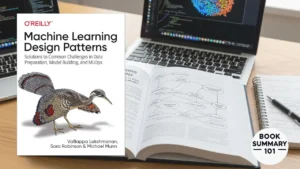If you’ve ever wondered how some people seem to pull groundbreaking ideas out of thin air, while others keep running into creative roadblocks, ALIEN Thinking: The Unconventional Path to Breakthrough Ideas by Cyril Bouquet could be the answer you’ve been looking for. This book isn’t just about creativity—it’s a full-blown guide to cultivating the right mindset and tools to produce fresh, impactful solutions to real-world challenges.
Here’s a breakdown of what makes this book a must-read if you’re on a mission to level up your innovative thinking and gain a fresh perspective on problem-solving.
Why Read This Book?
ALIEN Thinking is more than just another self-help or business book; it’s a manual for anyone eager to break the cycle of same-old ideas and reach their true creative potential. Here are three key reasons to give this book a read:
- It Simplifies Creativity: The ALIEN framework breaks creativity down into manageable steps, making it something anyone can practice, regardless of their “creative” background.
- It’s Actionable: You get practical advice to help bring ideas from the drawing board to the real world. Experimentation and Navigation, in particular, are about making things happen.
- It Changes the Way You See Problems: Rather than obsessing over immediate solutions, ALIEN Thinking encourages you to pause and examine your problem from new angles—leading to solutions you might not have even considered.
What Exactly is ALIEN Thinking?
Let’s dive deeper into the ALIEN framework—a five-step approach Bouquet outlines that not only makes creative thinking accessible to everyone but also provides a roadmap for turning ideas into impactful realities. ALIEN stands for Attention, Levitation, Imagination, Experimentation, and Navigation. Here’s what each principle means and how it contributes to generating groundbreaking ideas.
A – Attention: The Art of Noticing the Unnoticed
In today’s world, we’re constantly bombarded by information—notifications, messages, emails, news—all vying for our attention. This makes it easy to miss what’s right in front of us. The “Attention” part of ALIEN Thinking teaches us to pause and focus on the details others tend to overlook. By becoming more aware of subtle patterns, unique nuances, and overlooked gaps, you can find opportunities for innovation that most people miss.
Bouquet encourages us to develop the habit of “zooming in” on problems or situations, examining them with a heightened sense of curiosity. Think about successful entrepreneurs like Steve Jobs, who paid obsessive attention to the user experience and small design details, resulting in products that felt both revolutionary and intuitive. By tuning your attention to small, often invisible details, you open yourself up to discoveries that are often hiding in plain sight.
Try This: Start practicing focused observation in your everyday life. Pick an object or a situation and notice the details: What assumptions are you making? What stands out? What might be missing that could improve it? This exercise sharpens your ability to spot untapped potential in ordinary places.
L – Levitation: Step Back to See the Big Picture
Have you ever been so deeply involved in a task that you lost sight of the overall goal? Levitation is about stepping back—mentally and sometimes even physically—to gain perspective. This principle allows you to break free from the narrow focus of daily routines and see challenges from a higher vantage point.
Bouquet uses the metaphor of “hovering” above the problem to take in the full scope and context. When you levitate, you start to identify connections between unrelated fields, broaden your thinking, and develop an understanding of the wider impact. This principle is crucial for anyone looking to avoid tunnel vision and find unexpected solutions. Think about how Netflix’s pivot from a DVD rental company to a streaming giant required a huge mental leap and a willingness to detach from the present success of their business to envision a new future.
Try This: Next time you’re facing a problem, literally take a step back—go for a walk, look out a window, or just sit in a different part of the room. Let your mind drift and think about the larger context. How does this challenge fit into a bigger picture? Sometimes, distance leads to insight.
I – Imagination: Embrace Bold and Unconventional Ideas
The “Imagination” part of the ALIEN framework is all about daring to dream beyond traditional boundaries. This is where you start to envision ideas that are innovative, original, and perhaps a bit wild. Imagination is where you allow yourself to think freely, without limits or judgment, exploring paths that may seem impossible or absurd at first.
Bouquet argues that fostering an imaginative mindset is essential because it’s where the seeds of all big ideas are planted. Many breakthrough inventions and innovations started as ideas that seemed outlandish. Take LEGO, for example. This company not only expanded its classic brick toys but also incorporated digital interactivity, combining physical and digital play in ways people hadn’t expected. This leap in imagination helped them reinvent their brand for a new generation.
Try This: Give yourself permission to brainstorm without holding back. What if budget, time, or technical constraints didn’t exist—what would you create? Try writing down your wildest ideas without judging or filtering them. Often, the most exciting innovations start with an idea that seemed “too crazy” at first.
E – Experimentation: Test, Fail, Learn, Repeat
Once you have ideas, the next step is to bring them into the real world through experimentation. This principle encourages you to test your ideas quickly and cheaply to see what sticks, adapting as you learn. Experimentation isn’t just about “doing”—it’s about doing with a mindset that’s open to failing, learning, and iterating.
Bouquet emphasizes the importance of creating a safe environment where you can test assumptions and gather feedback. Think about scientists who run experiments in labs—they know that not every trial will yield the desired outcome. Similarly, entrepreneurs and innovators have to be comfortable with uncertainty and willing to tweak or even discard ideas as they go. For example, Thomas Edison reportedly conducted over 1,000 experiments before finally inventing a successful light bulb. He learned from every failure, seeing each as a step closer to success.
Try This: Start small. Pick one idea you’re curious about and design a simple experiment to test it. The goal is to learn, not necessarily to succeed right away. Ask for feedback, make adjustments, and run the experiment again. Over time, you’ll refine your ideas and increase their chances of success.
N – Navigation: Bring Your Ideas to Life Amid Challenges
Finally, Navigation is about moving your idea from concept to reality while steering through the practical, political, and economic challenges you’ll inevitably encounter. Having a groundbreaking idea is only half the battle—you need to be able to convince others, gather support, and stay resilient in the face of setbacks.
Bouquet describes navigation as the strategic side of innovation. It’s about understanding the landscape you’re working within and adapting your approach accordingly. This could mean gathering buy-in from key stakeholders, navigating financial constraints, or pivoting your approach to align with market demand. Successful innovators know that resilience is just as important as creativity, and they’re prepared to tweak their approach or even their vision when necessary to achieve their end goal.
Try This: Map out a plan for your idea that considers the hurdles you may face. Who would need to support this idea for it to work? What potential obstacles could arise, and how might you address them? By anticipating challenges, you’re better prepared to navigate them when they come up.
In the end, each part of the ALIEN framework builds upon the last, creating a holistic approach to innovation. By mastering Attention, Levitation, Imagination, Experimentation, and Navigation, you’re not just thinking creatively—you’re giving yourself the tools to turn those ideas into impactful realities. The best part? ALIEN Thinking isn’t a one-time exercise; it’s a mindset that you can bring into any problem-solving situation to unlock a world of possibilities.
Real-Life Examples
Bouquet doesn’t just give you theories—he backs them up with real-world examples from innovators who’ve made a tangible impact by using these principles.
- Netflix’s Transformation from DVDs to Streaming: The “Levitation” principle was pivotal here. Netflix’s leaders recognized that they had to step back from their physical DVD business and imagine an entirely new future. By “levitating,” they saw the potential in streaming content, paving the way for a media revolution.
- A Chef’s Eye for Detail: Attention to detail isn’t just for high-stakes tech companies. One example Bouquet gives is of chefs who zoom in on textures, flavors, and presentation to deliver a standout dish. Their level of focus on the smallest of details is what makes all the difference in their culinary creations.
- The Imagination Behind LEGO’s Reinvention: LEGO used “Imagination” and “Experimentation” to pivot from its classic brick sets to interactive, digital-friendly play experiences. They weren’t afraid to experiment, embrace digital, and try out wild new products.
These examples help bring the principles to life and show how anyone—from business owners to chefs—can apply ALIEN Thinking to produce results that might have seemed impossible at first.
Join the Conversation!
Have you read ALIEN Thinking? Or maybe there’s a time when you stumbled upon a great idea by seeing a problem in a new light? Let’s talk about it! Drop your thoughts in the comments below, or share your experiences with these principles on your own journey to creative breakthroughs. What aspects of ALIEN Thinking do you think you’d try first, or what’s worked for you in the past?
Creativity isn’t reserved for the “geniuses” or “artists”—it’s something we can all tap into. So, what’s stopping you from taking that first ALIEN step?
5 Quotes from ALIEN Thinking: The Unconventional Path to Breakthrough Ideas by Cyril Bouquet:
📖”Creativity doesn’t require genius—it requires a different way of looking at the world.”
→ A reminder that innovation is more about mindset than IQ.
📖”The ability to pay attention differently is often the seed of a great idea.”
→ True breakthroughs often begin by noticing what others overlook.
📖”Stepping back can move you forward.”
→ Levitation isn’t escape—it’s perspective.
📖”Imagination is not about fantasy; it’s about exploring the plausible, the possible, and the seemingly impossible.”
→ A powerful nudge to dream beyond the obvious.
📖”Experimentation is not failure—it’s refinement.”
→ Every test is progress, even if it doesn’t go as planned.



